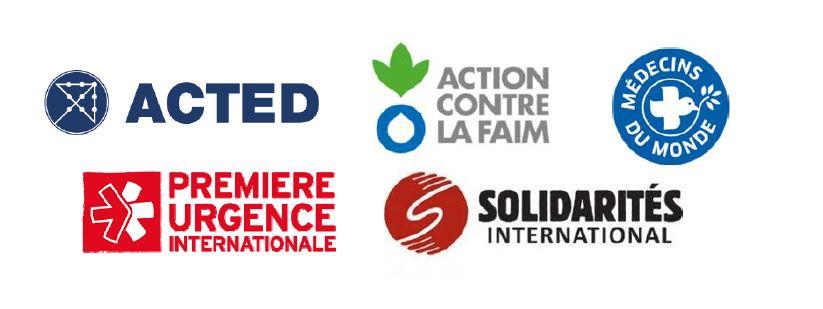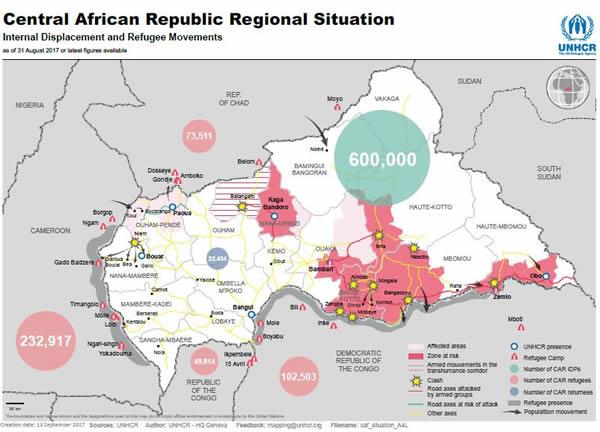
Paris, 19th of October 2017
After a few months of relative calm during the electoral period in early 2016, the Central African Republic is currently experiencing a considerable deterioration in its security conditions. The humanitarian situation in the country has now returned to the 2014 crisis level peak.
The civilian population, the first affected, suffers a double penalty: extreme violence that increases humanitarian needs, and the reduction of aid due to growing insecurity.
“In the last few weeks, fighting and violence against civilians has intensified. As a result, during the first half of 2017, 215,000 people had to flee their homes to seek refuge in more than precarious conditions,” explains Hélène Camus, ACTED Country Representative in CAR.
In total, more than one million Central Africans are now uprooted (one in five inhabitants), with increasing displacement to neighbouring countries and within the country.
Limited humanitarian access
Access to aid for vulnerable populations is increasingly limited. The progress of armed groups, which currently control 12 of the country’s 16 provinces in the centre and south, has severely constrained the effective delivery of aid by humanitarian actors.

“At present, NGOs have suspended all their activities in three cities across the country, depriving more than 100,000 people of humanitarian aid. In addition, 35% of the humanitarian aid stock managed in a warehouse shared between 18 organisations in Bangui cannot be delivered,” underlines Hélène Quéau, Director of Operations at Première Urgence Internationale.
For the third consecutive year, CAR is ranked as the country with the highest number of incidents against NGOs, with 232 incidents reported since the beginning of this year, and sometimes extremely violent attacks on health facilities or NGO premises.
“This reduction in the humanitarian space could turn the Central African crisis into an unprecedented humanitarian disaster“, says Isabelle Robin, Regional Director of Operations for the Central African region for Action contre la Faim
A particularly affected health system
In the Central African Republic, 2.2 million people need basic health care. Nearly 50% of the population suffers from chronic malnutrition, and the maternal mortality rate is the third highest in the world.
Furthermore, the specific problem of gender-based violence, which affects the vast majority of women, is extremely worrying. Since January 2017, Médecins du Monde has received 880 patients who have been victims of this type of violence in six health centres in the Bangui region, including 795 women and girls.
“In this highly unstable context, how can we help these people to sustainably rebuild themselves if those responsible are not condemned? Today, we hope that these survivors will finally have access to justice and that they will no longer be afraid of reprisals,” said Dr. Jean-François Corty, Médecins du Monde’s Director of international operations.
Today, the neutrality of health facilities is not respected and the health system threatens to collapse. “Basic infrastructure in CAR is poorly or not maintained at all. Thus, only 35% of the population has access to drinking water and only 27% has access to sanitation facilities. A situation that is deteriorating day by day, increasing health risks and exacerbating community tensions,” points out Marilyne Cittadini, Head of Mission for SOLIDARITÉS INTERNATIONAL in CAR.
At a time when Antonio Guterres, Secretary General of the United Nations, is about to visit the country as part of the renewal of the MINUSCA mandate, the NGOs present on the ground are calling on the United Nations and Member States to give the Mission the means to strengthen the protection of civilians, to re-mobilize itself on this crisis and to urgently increase the humanitarian response to the crisis.
Press contacts:
SOLIDARITES INTERNATIONAL : Tugdual de Dieuleveult – tdedieuleveult@solidarites.org ‐ + 33 (0)6 64 92 50 37
Médecins du Monde : Lisa Véran – lisa.veran@medecinsdumonde.net – +33(0) 1 44 92 14 31
Action contre la Faim : Mathieu Fortoul – mfortoul@actioncontrelafaim.org ‐ +33(0) 1 70 84 72 29
ACTED : Caroline Pasquier – caroline.pasquier@acted.org ‐ +33 (0)6 73 93 74 19
Première Urgence Internationale : Sophie Odeh ‐ sodeh@premiere‐urgence.org ‐ +33 (0)7 83 42 57 19
